The African grey parrot (Psittacus erithacus) is a remarkable avian species that has captivated humans for centuries with its stunning intelligence, vocal abilities, and charming personality.
Renowned for their exceptional mimicry skills and cognitive abilities, these parrots are native to the dense rainforests of West and Central Africa.
While much is known about their remarkable talents, their lifespan in the wild remains a topic of curiosity and fascination. In this article, we delve into what is the lifespan of an African grey parrot in the wild and explore the factors that impact their longevity.
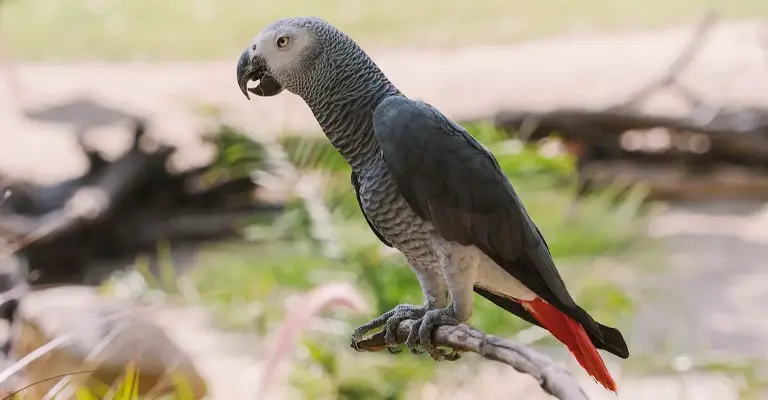
What Is the Lifespan of an African Grey Parrot in the Wild?
Estimating the lifespan of African grey parrots in the wild is challenging due to limited research and the many factors affecting their survival.
However, studies and observations suggest that they can live for an average of 40 to 60 years in their natural environment. There have been reports of exceptional individuals living beyond the age of 70 years, showcasing their remarkable resilience.
The African grey parrot’s impressive lifespan is complemented by its exceptional intelligence. These parrots have the ability to imitate human speech, solve complex problems, and demonstrate an understanding of language and concepts.
Longevity in African grey parrots is linked to their cognitive stimulation, social interactions, and a healthy environment that mimics their natural habitat.
What Influences the Lifespan of an African Grey Parrot?
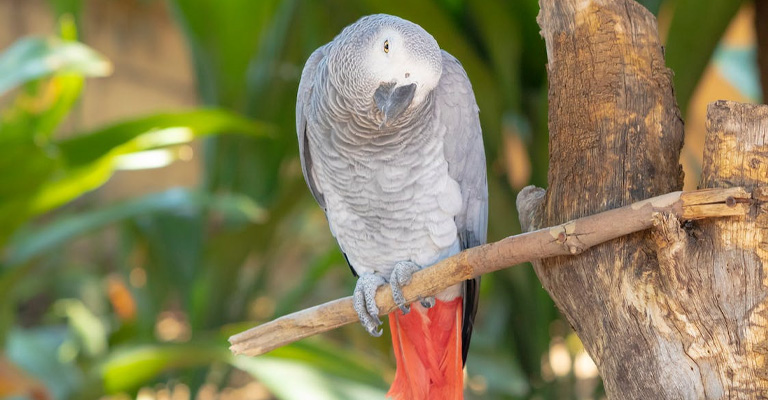
Several factors can influence the lifespan of an African Grey Parrot (Psittacus erithacus). Here are some key factors that can impact their longevity:
Genetics
The genetic makeup of an individual bird can play a role in determining its lifespan. Some birds may inherit certain genetic predispositions that make them more susceptible to certain health conditions or diseases, which can affect their overall lifespan.
Diet and Nutrition
Providing a well-balanced and nutritious diet is crucial for the health and longevity of African Grey Parrots. A diet consisting of high-quality pellets, fresh fruits, vegetables, and occasional nuts can help ensure they receive essential nutrients.
Poor nutrition can lead to various health problems and potentially shorten their lifespan.
Veterinary Care
Regular veterinary check-ups are essential to monitor the overall health of African Grey Parrots. Routine examinations, vaccinations, and diagnostic tests can help detect and address any potential health issues at an early stage, promoting longevity.
Environment and Exercise
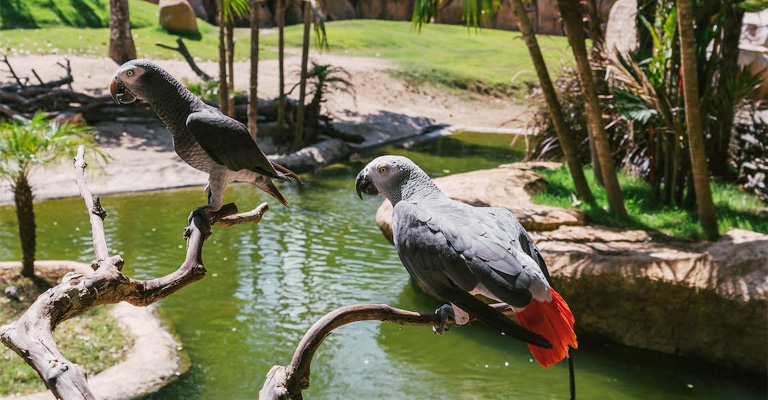
Providing a stimulating and enriched environment is vital for African Grey Parrots. They need ample space to move around and engage in physical and mental exercise.
Lack of exercise and a monotonous environment can lead to obesity, muscle atrophy, and behavioral problems, which can impact their lifespan.
Mental Stimulation
African Grey Parrots are highly intelligent birds that require mental stimulation to thrive. Regular interaction, socialization, and engaging toys or puzzles can help prevent boredom and the development of behavioral issues.
Stress and Emotional Well-being
African Grey Parrots are sensitive creatures that can be prone to stress. High levels of stress, such as loud noises, sudden changes, or lack of social interaction, can negatively impact their health and potentially reduce their lifespan.
Providing a calm and stable environment with appropriate socialization is essential for their emotional well-being.
Potential Hazards
Protecting African Grey Parrots from potential hazards, such as toxic substances, extreme temperatures, predators, and household dangers, is crucial for their safety and longevity.
It’s important to note that each African Grey Parrot is an individual, and while these factors can influence their lifespan, there are no guarantees.
Providing proper care, nutrition, and a nurturing environment can help maximize their lifespan and ensure their well-being.
Habitat and Climate
The African grey parrot relies on rich and diverse rainforest ecosystems for its survival. Deforestation, habitat loss, and climate change pose significant threats to their population.
Destruction of their natural habitat can disrupt their feeding patterns, breeding behavior, and overall well-being, which can lead to a decrease in lifespan.
Disease and Parasites
Like any wildlife species, African grey parrots are susceptible to various diseases and parasites. Avian diseases such as Psittacine beak and feather disease (PBFD), avian malaria, and bacterial infections can severely impact their health and lifespan.
Parasites like mites and ticks can also weaken their immune system and make them more susceptible to infections.
Human Activities
The illegal pet trade remains a significant concern for African grey parrots. Capture for the exotic pet market involves trapping adult parrots and removing their eggs from nests, often leading to high mortality rates.
How Long Do African Grey Parrots Live as Pets (In-Captivity)
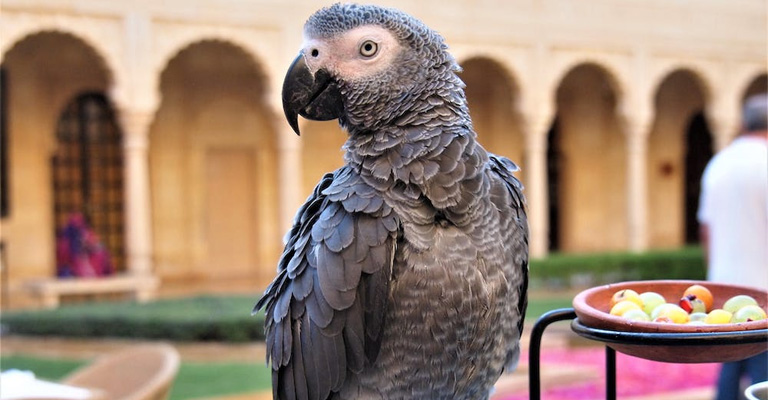
African Grey Parrots (Psittacus erithacus) are known for their intelligence and longevity. In captivity, African Grey Parrots can have a remarkably long lifespan.
On average, they can live for about 40 to 60 years, although there have been reports of some individuals reaching 70 years or even more.
The lifespan of an African Grey Parrot can vary depending on various factors, including the bird’s overall health, diet, genetics, and the quality of care it receives.
Providing a well-balanced diet, regular veterinary check-ups, mental stimulation, and a safe and enriched environment are important factors in ensuring the longevity and well-being of an African Grey Parrot.
How Can You Tell How Old an African Grey Is?
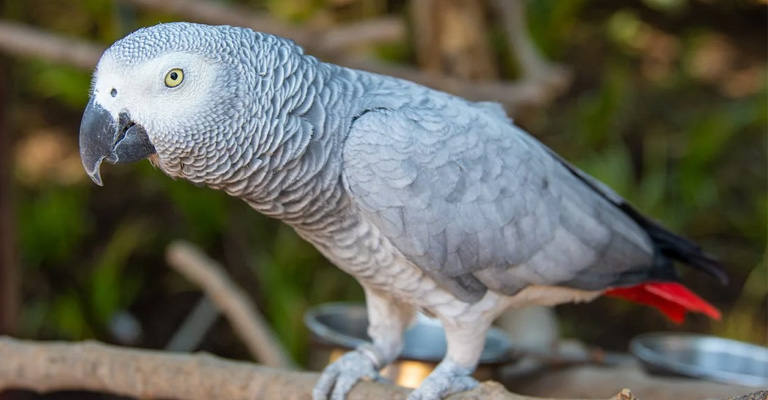
Determining the exact age of an African Grey Parrot (Psittacus erithacus) can be challenging once they reach maturity. However, there are a few indicators that can provide some clues about their age:
Leg Band
Some African Grey Parrots may have a leg band, which is a small metal or plastic band placed around their leg when they were young. Leg bands often contain information such as the year of birth or a unique identification number.
Eyes
Younger African Grey Parrots tend to have dark eyes, while older birds may have lighter or yellowish eyes. This change occurs gradually over time, so it’s not a precise method but can give a rough estimate.
Feather Coloration
The coloration of an African Grey’s feathers can change as they age. Juvenile birds typically have darker feathers that may lighten or develop gray markings as they mature.
However, this method is not entirely reliable as feather coloration can vary among individuals.
Behavior and Developmental Milestones
Young African Grey Parrots tend to be more active, curious, and vocal compared to older birds. They also go through various developmental milestones such as learning to fly, mimic sounds, or speak.
By observing their behavior and assessing their developmental stage, you may be able to make an educated guess about their age.
How Do Most African Greys Die?
The African Grey parrot (Psittacus erithacus), commonly known as the African Grey, is a highly intelligent and long-lived bird. The average lifespan of an African Grey in captivity can range from 40 to 60 years, and in some cases, they can live even longer.
However, like all living creatures, African Greys are susceptible to various health issues and environmental factors that can impact their lifespan. Here are some common reasons why African Greys may pass away:
Age-Related Conditions
As African Greys age, they become more prone to age-related health problems such as arthritis, heart disease, and organ failure. These conditions can eventually lead to their demise.
Malnutrition and Improper Diet
Providing a balanced and nutritious diet is crucial for the overall health and well-being of African Greys. A diet lacking essential nutrients, such as Vitamin A or calcium, can lead to weakened immune systems, organ dysfunction, and eventually, death.
Accidents and Injuries
African Greys are curious birds, and their intelligence drives them to explore their surroundings. Unfortunately, this can sometimes lead to accidents or injuries. Common risks include falling from perches, getting caught in doors or windows, or encountering toxic substances within their environment.
Respiratory Diseases
African Greys are prone to respiratory issues, including infections like pneumonia and Aspergillosis. These conditions can be caused by exposure to drafts, poor air quality, or bacterial and fungal infections. If left untreated, respiratory diseases can be fatal.
Stress and Psychological Issues
African Greys are highly sensitive birds that require mental stimulation and social interaction. If they experience prolonged stress, loneliness, or boredom, it can lead to behavioral problems and increased susceptibility to illnesses.
Toxic Substances
African Greys are vulnerable to certain substances that may be harmless to humans but toxic to birds. Examples include fumes from non-stick cookware, household cleaning products, pesticides, and plants like avocado, which can be harmful if ingested.
Accidental Injuries During Handling
Rough handling, mishaps during wing-clipping, or accidents during grooming procedures can result in injuries that may be severe enough to cause the bird’s death.
It’s important to note that this list is not exhaustive, and individual cases may vary. To ensure the well-being of an African Grey, it is essential to provide them with a healthy and stimulating environment, a balanced diet, regular veterinary care, and proper social interaction.
FAQs
Yes, African grey parrots are considered endangered in the wild. The species is listed on Appendix I of the Convention on International Trade in Endangered Species of Wild Fauna and Flora (CITES), which prohibits international trade unless it can be proven sustainable.
African grey parrots can have a relatively long lifespan in captivity if properly cared for. On average, they can live between 40 and 60 years, although some individuals have been known to live beyond 70 years.
African grey parrots are highly intelligent and social birds, making them captivating companions for those who can meet their specific needs. However, their high level of intelligence and emotional sensitivity requires dedicated care and attention.
There are several ways to contribute to the conservation of African grey parrots. Support reputable conservation organizations that focus on protecting the species and its habitat through donations or volunteer work.
Raise awareness about the threats facing African grey parrots by sharing information with others, both online and offline.
Releasing a captive-bred African grey parrot into the wild is a complex decision that requires careful consideration and adherence to local laws and regulations. While it may be tempting to release a pet parrot back into its natural habitat, there are significant challenges to overcome.
Final Words
That was all about what is the lifespan of an African grey parrot in the wild. The lifespan of African grey parrots in the wild remains an intriguing topic within avian research.
While they face numerous challenges that can impact their longevity, these remarkable parrots continue to capture the hearts of many with their intelligence and mimicry skills.
Protecting their natural habitat, combating the illegal pet trade, and raising awareness about their conservation needs are vital steps to ensure the survival of African grey parrots for generations to come.